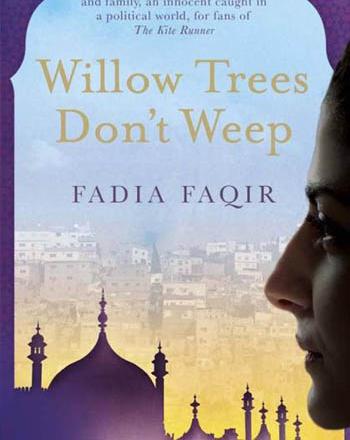You are here
‘Looking at the same sky’
By Sally Bland - Sep 07,2014 - Last updated at Sep 07,2014

Willow Trees Don’t Weep
Fadia Faqir
London: Heron Books/Quercus Editions, 2014
Pp. 276
Najwa, the protagonist of “Willow Trees Don’t Weep”, is a bundle of contradictions like the world around her. Self-effacing in public but often quite spunky in her private perceptions, her life has been shaped by growing up in an atypical family on the one hand, and the ripples of the Afghan war on the other. When she is only three years old, her father disappears, leaving her to be raised by her mother and grandmother in their modest house on an east Amman hill.
Deeply wounded and embittered at being deserted, her mother virtually withdraws from life and bans all mention of her husband, as well as all signs of religion from their home, because she attributes his departure to his having become a religious extremist.
The starkly secular and unhappy atmosphere of their home sets Najwa further apart from her neighbours and classmates, and causes her to question who she is.
When Najwa’s mother dies prematurely, her grandmother tells her about the letters, gifts and photos her father had sent over the years, but which her mother had kept hidden. Her grandmother urges her to go search for her father, saying she too will die soon, and Najwa cannot live alone in their conservative neighbourhood. Najwa’s solo journey takes her to Pakistan, Afghanistan and finally to Britain, challenging her with new vistas, questions and people unlike any she has encountered before.
Each destination gives her a new perspective on her father, and she feels increasingly torn between her mother’s memory and her newly evolving image of her father. Tension builds as one doesn’t know whether she will find him, and if so, will she find herself in the process of searching for the other half of her heritage. Though deeply angry at her father for leaving, Najwa imagines that someday they will be “looking at the same sky”. (p. 237)
The author, Fadia Faqir, cleverly uses the protagonist’s name to generate the structure of the novel. Najwa means a whisper or secret conversation, and the novel unfolds in alternating voices with Najwa and her father, Omar, each telling their version of events, establishing, in effect, an indirect dialogue between them, a secret conversation. The sections narrated by Najwa are in now time, as she makes her rather perilous journey but keeps dipping back into childhood memories, trying to find out who her father really is: “A murderer? A baby-abandoner? A wife-jilter? Or a revolutionary? A chaser of dreams and wider horizons?” (pp. 65-6)
Omar’s passages are excerpts from the diary he has kept over the years, revealing that his reasons for leaving were far more complex than religious fanaticism, and his journey dictated as much by circumstance as by choice. Like his daughter, he is faced with a world he doesn’t control. When young, he shared utopian dreams with Hani, his best friend since childhood. When traumatic experiences lead Hani to join the battle for Islam in Afghanistan, Omar feels he should go along in order to protect him. His training as a nurse enables Omar to help so many in that war-torn country, but eventually, enraged by seeing so much devastation inflicted on fellow Muslims, he gets more deeply involved.
Besides telling a powerful story, Faqir’s main achievement in this novel is her ability to subtly depict the contradictory feelings of her main characters, especially Najwa’s love-hate relationship with her father, and his agony at being caught between his idealism and what is possible in an imperfect world. The author’s imagery and sense of detail make landscapes, whether in Amman, Peshwar, Mazar-e-Sharif or Britain, come alive and even contribute to conveying the characters’ state of mind.
Besides the obvious question of what can drive an ordinary person to violence as a means of achieving otherwise admirable goals, “Willow Trees Don’t Weep” raises many issues about the meaning of family cohesiveness and people’s responsibility to one another. It also graphically illustrates injustice on a global scale, contrasting the horrific conditions prevailing in countries like Afghanistan with the comparatively idyllic life in countries perpetrating violence against them. Yet, the picture is never black and white; in each place Najwa visits, she finds both compassionate and uncaring individuals.
“Willow Trees Don’t Weep” is available at the University Bookshop. There will be a launch for the book on September 9 from 6:00pm to 8:00pm at the Landmark Hotel here in Amman.
Related Articles
Couples who are married for more than 50 years end up doing sweet things for each other. It’s not that the younger ones tied in the matrimonial bond do not do so. But somehow it seems more thoughtful when the elderly lot goes about it in a methodical manner.
Returning to her native country, Lebanon, after fifteen years spent in Australia and Kenya, gives Mariam final proof of her state of displacement and transience — always being on the verge of leaving (symbolised by thirteen suitcases kept on the ready in her Mombasa home).













